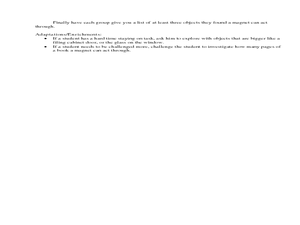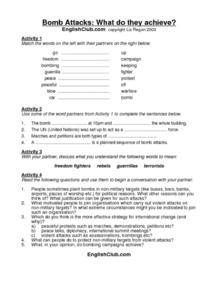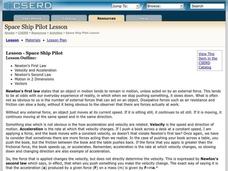Curated OER
Simple Machines Worksheet
In this simple machines worksheet, students match the simple machine to its definition. Students then identify the pictures by the type of machine it represents. This worksheet has 6 matching and 12 fill in the blank questions.
Curated OER
Layering the Soil
Students study and classify soil. In this soil science lesson, students classify soil by texture and size and study soil horizons. Students label the soil types with their specific soil horizon and learn about permafrost. Students...
Curated OER
Exploring Magnets
Second graders experiment with magnets. In this magnet instructional activity, 2nd graders attach a magnet to several different objects to see what it sticks to. They place objects in between a magnet and metal to see if the magnetic...
Curated OER
Why is There a Tidal Bulge Opposite the Moon?
Students simulate how the Moon causes ocean tides. In this earth science lesson, students calculate gravitational acceleration using a mathematical formula. They compare the force of attraction between the Earth, Moon and Sun system.
Teach Engineering
Ampere's Law
Help your class find the the magnetic field of a toroid, a solenoid bent into a circle with an activity that allows the class to see how a loop of wire carrying an electrical charge behaves much like a magnet. The resource provides...
Teach Engineering
Get Me Off This Planet
What do Newton's Laws have to do with getting from Earth to Mars?The activities in this resource show how Newton's Laws work with rockets to get them into space. Background information includes facts about orbits and how orbits...
Novelinks
The Lightning Thief: Problematic Situation Strategy
In the novel, Percy Jackson and the Olympians: The Lightning Thief by Rick Riordan, Percy is faced with a major decision. After reading, chapter 19, discuss the decision-making process Percy took, what he decided to...
Curated OER
Science: Electric Fields from Point Charges
Students examine electric fields using viewers to discover the direction of positive charges and the location of the field's strength. They experiment with positive, negative, like and opposite charges. Students also describe how...
Curated OER
Actual Airflow vs. Ideal Airflow: Stalls
Students use 3-D modeling techniques to observe the characteristic signature of the stall condition apparent on an airfoil at high angles of attack. They use FoilSim to compare the above with ideal airflow.
Curated OER
Bomb Attacks: What Do They Achieve?
In this bomb attacks and what do they achieve worksheet, students, with a partner, examine, analyze, discuss and complete a variety of activities associated with bombs and the effects of them worldwide.
Curated OER
Erosion: On the Move...Defending the Coast Against Wave Attack
Students study how people have tried to save beaches from wave erosion. They examine what has occurred to Cape Hatteras as a result of beach erosion and the efforts to reduce the erosion.
Curated OER
Instruments and Measurement
Students circulate through stations to determine the proper instrument to make a certain type of measurement. They must make measurements of mass, volume, length, area, electrical current, temperature and force.
Curated OER
The Age of the "Isms"
In this online interactive world history instructional activity, students answer 20 matching questions regarding government and society. Students may submit their answers to be scored.
Curated OER
Sounds Like Science - Kazoo
Students discover that energy is needed to produce sound. They see that identifying where the energy comes from enables us to control the type of sound produced. They play the kazoo and manipulate the sound in a variety of ways.
Curated OER
Coefficient of Kinetic Friction and Surface Area
Young scholars investigate coefficient of friction with respect to surface area and applied force in contact with the sliding force.
Curated OER
Where People Work
Students investigate where people work. In this social studies lesson, students use a Landscape Picture to locate places of work. Students discuss how each job is similar and different.
Curated OER
Building a House: Laying a Foundation
Third graders examine how a house is staked when preparing to build while they discover what the foundation is made of. They study how the foundation is poured and that the plumbing is included. They identify the workers and tools used...
Curated OER
Post-War Suburbanization: Causes and Interpretations
For this teaching American history worksheet, high schoolers examine a primary source document regarding post-World War II suburbanization. Students discuss their impressions of the document.
Curated OER
How Many? How Far? How Thick?
Fifth graders examine the role of magnetism and electricity. In groups, they are given different types of magnets and discover how the magnetic force differs for each one. They measure the amount of distance a paper clip moves toward...
Curated OER
Simple Machines
Fifth graders study how simple machines can help us alter forces and discuss the term mechanical advantage. They then identify dysfunctional simple machines and discuss in groups how the dysfunctions will decrease the effectiveness of each.
Curated OER
Impulse and Momentum
Students are introduced to the concepts of impulse and momentum and problem solving strategies for these types of problems. In groups, they discover the law of conservation of momentum and share their answers with the class.
Curated OER
Space Ship Pilot
Students visualize the relation between acceleration and velocity in 2 dimensions. They are introduced to Newton's first law,and Newton's second law. Students work on an exploration activity where they condsider an example of a...
Curated OER
Bounce (Projectile Motion And Collisions)
Young scholars analyze the motion of an object as it moves through a complex path that includes rolling, falling, and bouncing. They answer questions related to what forces are acting at any given time.
Curated OER
Simple Machines/Technology
Third graders examine the concept of work as the movement of an object through a distance. They define gravity and determine what type of work is caused by gravity. They measure how far an object is moved by a force. They make a...























